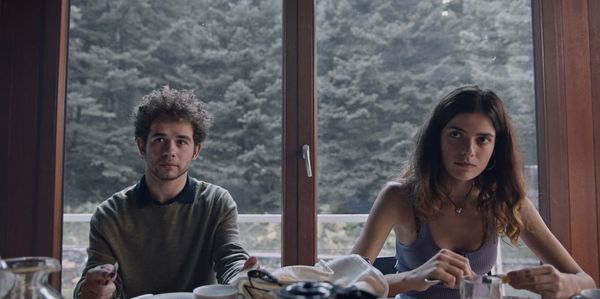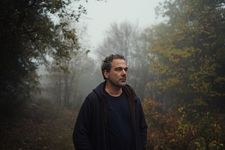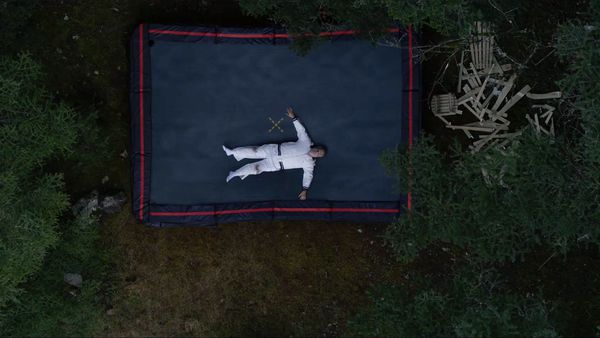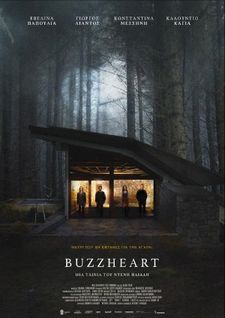 |
| Argyris (Claudio Kaya) and Mary (Konstantina Messini) in Buzzheart. Messini: 'I think Dennis has created something unique' Photo: Courtesy of POFF |
Argyris (Claudio Kaya) is every inch the average 19-year-old but his life takes a turn for the strange after he encounters physiotherapy masseuse Mary (Konstantina Messini) - from whom he is hoping for a little extra - and she invites him on a dating weekend. The only hitch is, it will include meeting her parents. Iliadis sets the scene for what is to come with opening credits detailing behavioural science experiments on animals. And, on arrival at Mary’s parents’ country house, it quickly becomes obvious this will not just be a case of sharing a glass of wine over a meal. Mum and dad (Evelina Papoulia and Giorgos Liantos) are soon setting Argyris a series of increasingly bizarre challenges to test his love for her daughter. We caught up with Iliadis and his star Messini at Tallinn Black Nights Film Festival, where Buzzheart premiered, to talk about the development of his twisty thriller and working together on it.
What made you decide to put behavioural science at the heart of your film?
Dennis Iliadis: It's two things. One is my studies. I studied semiotics and psychology so this behaviourist theory was something I had studied also growing up in Greece. Also, growing up in Greece there was a sort of a la Grecque behaviourism that I experienced in the sense that parenting was not so much about how you can blossom from within but more how you create an environment for a kid and really form that person.
 |
| Dennis Iliadis: 'I'm getting softer, but I'm keeping the darker tricks' Photo: Courtesy of POFF |
Can you tell me a bit about what you thought, Konstantina, when you read the script, because this is quite a challenging role, in that there’s an additional layer of performance to it as your character and Argyris try to give the parents what they want.
KM: When I first read the script, I loved it and on every page I was feeling different things for every character and I really wanted to understand Mary and why she’s doing what she’s doing. I think Dennis has created something unique.
I’m guessing you are a bit older than 18 and I’m wondering why you, Dennis, decided to keep the teenage ages for your two leads even though the actors are a bit older than that?
DI: Well, I think especially for the male role, it was important to still have, still a very idealistic sense of love and not let cynicism seep in. And I felt that they needed to be the same age as each other, so it was the boy that informed the decision.
It seems as though it’s the first role for Claudio Kaya, so can you tell me about how you went about casting him?
DI: Even in my first film, Hardcore, which I did a while ago, I found four young actors who later became leading actors in Greece. So I really wanted to find fresh faces and Claudio has this amazing combination of innocence and determination, like he has the soul of a kid, but he's also extremely determined and that's something that really works for the character. With Konstantina, on the other hand, we had done a commercial together and I had seen some of her work. She hasn't done much and is not that experienced, but she came in and did an audition which was so amazing I didn't see anyone else. This is the first time ever that I cast the first person I saw.
The casting of the parents - actors Evelina Papoulia and Giorgos Liantos - is great as well.
There’s a little trivia there in that those two were actually married in real life. They divorced about 20 years ago but they were married for three or so years. They're very good friends. As you said these performances are very complex because a lot of people are performing and holding out and it's a reverse twist.
 |
| Giorgos Liantos in Buzzheart. Dennis Iliadis on his star: 'He was a bit stiff in the training but all of a sudden when the cameras went on, the second take - Bruce Lee!' Photo: Courtesy of POFF |
The house where they go to stay with the parents is also a big character in the film, can you tell me a bit about the location?
DI: It’s set in the Nineties, which was a period when Greece was trying to be modern. So this was one of the first truly modern houses that was built in the Greek countryside and it belongs to a friend of mine, so we had it for free. We wanted that sort of beautiful glass prison. It’s open plan but at the same time, the bedrooms are in the basement so you only see the grass, you can't really see the whole view.
The film is about conditioning to a degree and with the opening credits, which show behaviourist experiments involving the conditioning of animals, you’re trying to condition the audience in some ways.
DI: Yes, the audience's perception is really tested through the film. I think, after a certain point you're somewhat subjected to the same test that Argyris is subjected to because you know you're trying to understand what's going on and you're like okay what's going to happen to me next? It's interesting you know how people read the blackboard evaluation with all the appraisal elements [of character traits]. Many people took this blackboard very personally, like, ‘Okay, I was reading it and I was seeing things about him but about me too’.
There’s some testing things for the actors as well - how did you find all the trampoline work?
KM: I took some trampoline lessons before to feel safe and comfortable and I love it. I’m continuing with the classes.
DI: Konstantina’s very method, she really wanted to nail it. She’s also a dancer so it was easy for her. For the husband to do a karate kick… that took some time. There was a lot of stress, like, ‘Is he going to be able to do it?’ He was a bit stiff in the training but all of a sudden when the cameras went on, the second take - Bruce Lee!
Did you have a lot of rehearsals because a lot of this is based on the tension between the four characters and how that shifts.
DI: The way I rehearse is very loose. We read the script, everyone throws in ideas and we do some improvisational games. Then we do theatrical rehearsals, we have a space with a few elements and pieces of furniture. We design every different room and then we do it in real time. So when you go from the bedroom to the living room, they move the furniture and then get the right position, so that prepares us for the blocking when we get on location.
Even though this is quite a dark film, it’s also quite humanistic. Do you think it’s because you have a history of horror that you wanted to bring in more of this other element?
DI: I wanted to use all the elements I’ve learned in my American films which, in the end, were getting a bit too “standard horrorish” and do something ideally more deep and human. The tricky thing with this film is that it uses a lot of thriller tricks but never delivers on what you’re expecting to be delivered.
 |
| Buzzheart poster |
Was it nice to come home to shoot this?
DI:I really wanted to do something more personal, so it was easier for me to do it in Greece, because I have a lot of people who are willing to contribute and it's more flexible than shooting in the US.
So do you think you’ll make more in Greece now?
DI:I think it’s going to be a combination. I have an English language project, which I think we're gonna try and shoot in Greece, so that would be combining both worlds. There are thriller elements but it's even more towards humanism. I'm getting softer, but I'm keeping the darker tricks.





















